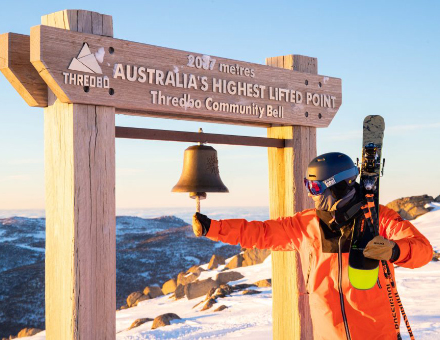SAM Magazine—New South Wales, Australia, June 25, 2021—Ski areas in Australia and New Zealand are beginning another pandemic-tinged winter season. Strong demand, increased capacity, and greater familiarity with Covid protocols offer a promising picture, although variables like vaccine rollouts and staffing challenges remain in play.
Thredbo in New South Wales, Australia, broke pre-season online sales records. “Demand is the strongest I have ever seen, with a captive domestic market,” said GM Stuart Diver.
Covid Operations
In compliance with government guidelines, Thredbo is operating this season with a number of Covid protocols still in place, including social distancing, masks where social distancing is not possible, increased sanitation measures, contactless purchasing, and a “stay home if unwell” policy.
Lifts are loading at full capacity, though, as long as all parties are masked, and indoor capacity limits in New South Wales increased to 70 percent occupancy, allowing Thredbo to expand F&B capacity and operate its Children’s Snowsports Centers this season.
Despite being allowed to welcome more guests, Thredbo capped season pass sales for the first time. That decision will not only allow the resort to more easily comply with government restrictions, but also to provide a better guest experience, said Diver.
“The biggest learning from last season is that the guests liked being in a resort that was not overcrowded,” he explained. “We are focusing on providing our guests with a more premium experience by moving away from a volume-based model.”  Thredbo in New South Wales, Australia
Thredbo in New South Wales, Australia
For NZSki, which operates Coronet Peak, Mt. Hutt, and The Remarkables in neighboring New Zealand, the major takeaway from last season was the need for an easy-to-use online booking tool. “In a covid environment, we encourage online purchasing, however that has highlighted some challenges in our online booking processes for guests. We’re now making changes to our webstore to make purchasing online easier,” said CEO Paul Anderson.
The vaccine rollout has been slow in Australia and New Zealand, with guests and staff only just starting to receive inoculations. The government in Victoria, Australia, where Falls Creek, Mount Hotham, and Mt. Buller operate, is requiring travelers from hot spots, like Greater Melbourne, to produce a negative Covid test before hitting the slopes.
New Zealand operators are facing fewer restrictions in that respect. New Zealand is currently at Covid alert level 1, which means that resorts are allowed to operate without capacity caps. “If New Zealand moves into alert level 2, then we do need to reduce our capacity slightly to safely manage physical distancing on mountain,” said Anderson. NZSki’s resorts are working from the foundational pandemic protocols the company developed for the 2020 season.
“As we don’t have Covid in the community [in New Zealand], there isn’t the same sense of urgency to get everyone vaccinated, so a majority of our staff won’t be vaccinated until later in the season,” added Anderson. “We did push for our patrol and med rescue teams to have access to the vaccine as they are the ones to be in regular close contact with guests.”
Successes and Challenges
Early season operations are going well, despite some warmer weather, which delayed openings for many of New Zealand’s South Island ski areas. “We did have a record opening day at Mt. Hutt with over 2,200 guests on mountain,” said Anderson. “Since then, our numbers have been really good, and our forward bookings are ahead of what they were this time in 2019.”
That strong visitation is comprised largely of domestic guests. A quarantine-free travel bubble between New Zealand and Australia began in April. However, a recent cluster of outbreaks in New South Wales has paused travel from the region as of June 22, potentially limiting visits to ski areas during the traditionally busy Australian school holiday period.
Limitations on travel are generating staffing challenges for resorts in the both countries. Southern Hemisphere resorts have historically hired a significant portion of staff from Europe and North America. “With no international staff to access, [staffing] has been extremely difficult, especially in hospitality and snowsports,” said Thredbo’s Diver. “Most other departments are covered by domestic staff.”
NZSki is working with New Zealand’s immigration department to obtain special permission for certain skilled staff, such as highly skilled groomers and instructors, to enter the country. NZSki also worked hard to court the domestic market. “Earlier this year, we worked on a bit of a campaign to encourage Kiwis to consider taking their OE (overseas work experience) in a mountain town like Queenstown this year, which worked really well,” said Anderson. “We have managed to fill most roles with New Zealanders.”




